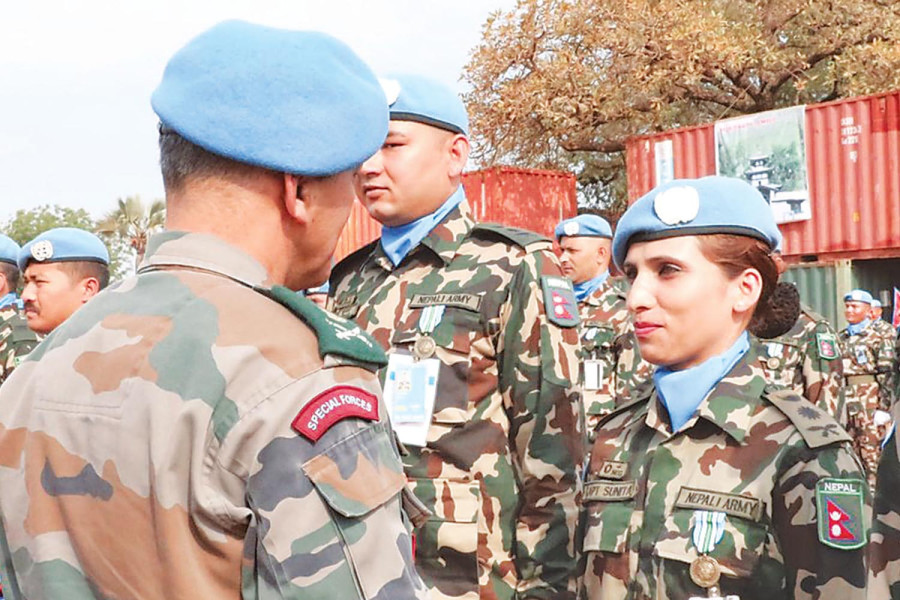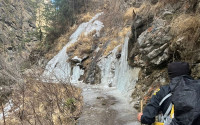National
Nepal becomes top troops contributor to UN peacekeeping missions
As of November 30 last year, 6,247 Nepali personnel were serving in conflict zones.
Post Report
Nepal has added another feather to its cap! It has become the largest troops contributing nation by overtaking another South Asian country, Bangladesh, according to the latest data provided by the website of the United Nations Peacekeeping Operations.
Nepal started participating in the United Nations peace efforts from 1958 by sending five observers in the United Nations Observer Group in Lebanon (UNOGIL), Lebanon. Purano Gorakh Battalion was sent as the first Nepali contingent in the United Nations Emergency Force (UNEF–II), Egypt in 1974, according to the Nepal Army.
According to the office of the UN peacekeeping operations, by the end of November 30, 2023, Nepal was already the top troop-contributing country in terms of the deployment of both military and police. By November 30, as many as 6,247 Nepali military and police personnel (Armed Police Force and Nepal Police) were serving in various conflict zones.
Bangladesh is the second-largest troop contributing country after Nepal. As per the data provided by the UN peacekeeping office, 42 Nepali army and police are serving as experts in different conflict zones. Similarly, 180 formed police units, 56 individual police, 104 staff officers both from the Nepal Army and Nepal Police and 5,865 Nepal Army personnel are deployed in various peacekeeping missions.
As many as 6,197 troops are contributing in various conflict points as peacekeepers from Bangladesh. Out of 6,247 troops deployed, the number of male troops is 5,645 and remaining 602 are female. The United Nations has deployed the largest numbers of peacekeepers in the United Nations Multidimensional Integrated Stabilization Mission in the Central African Republic followed by the United Nations Mission in South Sudan.
The Nepal Army dominated the figure in comparison with the Armed Police Force and the Nepal Police.
“This is good news for us,” said Krishna Prasad Bhandari, Nepal Army spokesperson. “As per the recent UN peacekeeping operations data, we have become the largest troops contributing nation. We don’t know whether this pace will continue but at present we are number one.”
“We are also trying to increase the number of female peacekeepers,” said Bhandari.
During several high-level visits, Nepal has been asking to serve in senior positions of the UN peacekeeping missions as well as wanting to increase the numbers of female peacekeepers.
According to the Nepal Army, Nepali peacekeepers are deployed in Congo, South Sudan, Abyei Sudan, Western Sahara, Israel, Lebanon, Mali, Syria, Central African Republic, Iraq and Yemen. The participation of Nepal Army in the UN Peacekeeping Operations spans 64 years and covers 44 UN missions.
Since 1958, a total of 149,890 Nepali peacekeepers have served in UN missions. This number includes 8,615 members of the Nepal Police and 8,785 from the Armed Police Force. Besides deployment in the field, senior Nepali military officials have served in higher positions like head of mission, force commanders, deputy force commanders, planning officer at P4 level, military planning officer, assessment officer, military training officer, sector commander, task force commander and military advisor.
Throughout the peacekeeping journey, according to the Nepal Army, 73 Nepali peacekeepers have died and 68 have been wounded.
As many as 2,554 women peacekeepers have served in various peacekeeping missions and at present 608 or 10 percent of the total deployment of Nepal are female, according to the data provided by the Nepal Army.
Besides sending the highest numbers of peacekeepers, Nepal conducts regional and international peacekeeping training at Birendra Peace Operations Training Center in Panchkhal of Kavre district.
Nepal also contributes financially to UN peacekeeping operations by paying the assessed contribution as per the rules of the United Nations. The assessed contribution to each of the missions is based on the size of an economy, according to the Ministry of Foreign Affairs.
Nepal has also contributed through the provision of niche capabilities such as engineers, military police, and special force contingents. Additionally, Nepali civilian experts have participated in peace missions in their personal capacities.




 9.56°C Kathmandu
9.56°C Kathmandu













